 // Creative Commons photo by Jim Makos. // // Creative Commons photo by Jim Makos. // I remember when I first read The Hunger Games, I liked almost everything: the action, the dystopian world-building, the character development. What I didn’t enjoy was the use of first person, present tense point of view. It seemed silly to me. Well, guess what? Several years later, I find myself employing the same POV as Suzanne Collins, and many YA authors who followed her, for my suspense novel. I suppose that makes me the silly one. Actually, I realized that the immediacy that both the writer and the reader feel when “I” am telling the story is powerful. You are able to get inside the head of the protagonist and follow him or her on a compelling journey in which all other distractions are cast by the wayside. When I wrote Fool’s Luck, I would sit for hours on end, banging away on the keyboard as I tried to capture the words flooding out of my head. I lost track of time and external reality as the story itself became the world I was living in. I only hope by using the first person (and the present tense in the first and last chapters) that readers will get as lost in the story as I did.
0 Comments
 Creative Commons photo by Doug Wilkowske Creative Commons photo by Doug Wilkowske While I made the leap to streaming TV last year, my wife and I still watch some shows that have a traditional 24-episode arc. Recently we watched two season finales of series we have enjoyed for years. Both of them used the plot twist of bringing back old characters who had been written off years earlier. One show did so in a believable fashion that stayed true to the character and her motivations, but the second attempt was much less successful (in my eyes at least). The latter featured a storyline about a couple who rode off into the proverbial sunset after years and years of romantic tension but when we checked in with them today, their (and our) hopes and dreams had been dashed on the harsh rocks of reality. While the technique worked (it wasn’t like they had been abducted by aliens and just returned to Earth to save the hero), it was so unfulfilling that I have taken to choosing the “reunion” never happened. I simply erased it from my mental hard drive and reverted back to the previous version of the story. I admit this is a radical step for TV show fan and perhaps a rude one for a fellow writer with nowhere near as much experience. But I was reminded of a valuable lesson: writing is not merely an art but a responsibility. It is easy to introduce more and more complex twists and turns in your narrative. The problem is we can just as easily forget we write for an audience of more than just ourselves. A series of movies or a long-running TV show has developed a loyal following and, as have we learned from the Game of Thrones ending (well, others learned, as I am apparently one of a dozen Americans who is not a GoT fan), pleasing, or at least respecting, the audience is the number-one goal of a writer. Let’s just hope I get it right with my own script. Thankfully, I have a fellow scribe much better at the craft to keep me on the straight and narrow.  Creative Commons photo by David Yu. Creative Commons photo by David Yu. As we speak, I am doing something most novelists only dream about: I am working with a friend to convert one of my novels into a screenplay. Of course, like one might expect, visions of being on the set while famous people bring your words to life danced through my head (and, rather foolishly, I was already pondering the opening lines to the Academy Award speech I will never give). I quickly wrote a first draft that closely matched the book, but condensed the key elements like a fine balsamic reduction. I was rather pleased with how easy the process was. Beaming like a proud parent, I sent it off to my screenwriter friend who wanted to partner with me. He took a quick look at it and quickly informed me that, while I was a good writer of books, stories on the screen just are not told the same way. It’s all about the visuals and the pacing is much different. So, what we have set out to do is create a story inspired by my original work. What I thought was going to be like puppy undergoing a bit of primping to be ready for a dog show has become like a caterpillar being transformed into a butterfly. The core elements are the same, but they are displayed in radically different ways. I am learning how to write all over again and, when I watch a TV show or movie, I am seeing with new eyes and listening with new ears. My critiques are more nuanced, but I also see the things writers and directors do well and I appreciate their genius more than ever before. So, while I might grumble like J.R.R. Tolkien’s ghost when Peter Jackson took a bit of cinematic license with the Lord of the Rings series, I must admit that the movies were fairly popular and works of cinematic splendor. I also need to keep in mind books and movies are two separate entities. I have a family member who loves A Prayer for Owen Meany, but does not like the film adaptation Simon Birch at all. I, on the other hand, rather disliked the book but absolutely adore the film. While it may be hard, it’s important to remember the caterpillar of the written word and the butterfly of the moving picture are both beautiful in their own ways. 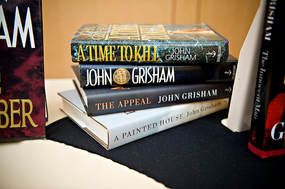 I recently read John Grisham’s latest, The Reckoning, a fascinating tale whose content and format are a departure from his norm. I wasn’t quite sure how to review the book and, when I went to read the comments of others, I realized I wasn’t alone. Those who are fans of John Grisham are addicted to the formula that won him such popularity: a young, idealistic lawyer goes up against impossible odds, beats the bad guys and (often) gets the love interest in the end. Most of his career has been based on this winning strategy. In his latest book, which uses an unexplained murder case as bookends for a harrowing tale about the Bataan Death March, Grisham gives readers a Gothic tale, murkier and more ambiguous than his normal fare. This has irked his readers, but I think that’s a bit unfair from the point of view of the writer. Growing up I read The Hardy Boys, while girls my age may have read Nancy Drew. These were formulaic serials in which variation and maturation were strictly forbidden. In the modern era, authors like Clive Cussler and Sue Grafton have done much the same (though Grafton, who passed in 2017, explored a bit more growth with her protagonist Kinsey Millhone). But what happens when writers want to grow and expand beyond what they have done before or even (Perish the thought!) write in a different genre? Well, they have to get a bit creative. Famed horror writer Stephen King created the pen name Richard Bachman, while more recently, best-selling Christian author Davis Bunn as adopted the persona of Thomas Locke to produce general market titles in a dizzying variety of genres. These writers, and many others who have assumed noms de plume to express their creative range, have done so because they yearned to defy the expectations placed upon them. As for my thoughts on The Reckoning, I will agree that while the book is not a good “John Grisham novel”, it is a good novel by John Grisham. The fact I have to make this distinction saddens me.  Whether laced with abject fear or indescribable giddiness, one thing all writers dream about is going on a book tour. You have visions of flying into a faraway town and being swept from book shop to book shop. You meet fans, sign copies of your masterpiece and get interviewed about you characters and what makes them tick. When you’re an indie writer, this is where the bubble bursts. Forget jet-setting and limo rides. The only book tour you can afford to take is to chatting up about your latest tome with the cashier at Trader Joe’s or Target. But there are economical ways to get people buzzing about your book and one of them is the virtual book tour. Basically, you sign up for a service where people agree to read your books and review them, providing that much needed booster shot either before or just after a book launch (Before works best). The plus side is that people who others listen to are reading your book. They are sharing their thoughts, discussing the relative strengths and weaknesses of your story line and character descriptions. You have arrived. People who enjoy your genre have picked up your book and are telling their friends about it. This also is the downside. The problem with indie writing in particular is that you tend to live in this isolated bubble where your family and friends who love you are just amazed you wrote a book (or another book). They likely aren’t going to say anything too bad. When you ask people to give honest opinions in their reviews, that is exactly what they are going to do. While I have more Amazon reviews than any of my other titles, my overall rating is lower than with my previous books. I still have really good reviews, but I’m probably not as good a writer as those who love me kept telling me I was. All in all, I wholly recommend creative and cost-effective ways to promote your books, even if not every response is glowing. There is an axiom about too much heat and a kitchen that comes to mind. 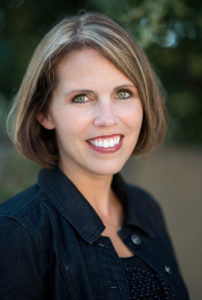 A lawyer and college professor, Cara Putman’s skills in crafting solid, fast-paced legal fiction comes from a mixture of experience and imagination (unless she’s actually been chased down by an angry drug cartel leader, which I hope is not the case). Delayed Justice, the latest book in the Hidden Justice series (Beyond Justice and Imperfect Justice round out this trilogy) features a great blend of solid writing and a good story. When did you first realize you were a storyteller? I have always loved books, but I was 13 or 14 when I actively started writing and dreaming up stories of my own. When I started college at 16, life wasn't really my own, so I stopped writing until I was 31. But I have always read voraciously. I must read. I must be surrounded by story. So, it makes it natural that I see stories all around me and itch to tell them. What do you love about the writing process? I love the research. I love the discovery of the characters. To me the hardest part is the beginning. Getting the idea cemented in my mind. Figuring out how the characters will interact and what they really want. Then I hit a point where the story simply flows. That is the best! I love to live in that space where I can't wait to get back to writing. It carries me through the not as fun parts. What is the hardest part of being a writer? How solitary it is. I'm an extrovert, so I can't just write. I have to have space to interact with people and pour into them. That's why the combination of writing and teaching at a world-class university works so well for me. I also don't enjoy the early stages of wrestling for the next big idea. Where do you find your inspiration? I find my inspiration all around me. For the Hidden Justice series it was in newspaper articles and in people I know. I take many different situations and pull them together and twist them up into something new and different. That's where the germ of the story is located. And that's what keeps me writing and marketing for the months each story requires. What are you working on right now? I'm in the idea germinating stage. I have several floating around in my mind and trying to flesh a couple up enough to sell to my publisher. These will be standalone legal ideas and that excites me! To find out which of these ideas blossoms into her next novel, follow Cara on her website. 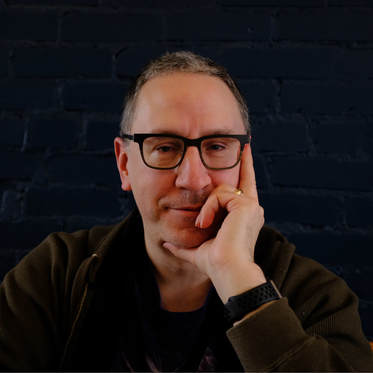 Gene Doucette doesn’t necessarily like to play in the genre sandbox to which sci-fi is typically confined. The Spaceship Next Door, for example, reads like the literary love child of The Hitchhikers Guide to the Galaxy and The Gilmore Girls (or so I said in my Goodreads review). He creates distinctive voices and characters, which is a breath of fresh air, especially when you’re fighting aliens and whatnot. When did you first realize you were a storyteller? I’m pretty sure I never had such a moment, or if I did, it didn’t happen in the way the question implies. I decided I was going to be a writer at roughly the same time I learned how to read. Probably, this involved Shel Silverstein, only because the earliest recorded piece of writing from my hand is a poem in big block letters, recounting how six-year-old me felt about snow. But I didn’t discover I had a gift for writing—or storytelling in general—and then decide to start doing this; I spent my life working out what kind of person I needed to be in order to become a writer. What do you love about the writing process? The surprises. It’s great getting into a rhythm in a story and then having it go somewhere unexpected. I know I’m writing the thing, but when the plot twist pops up, I’m as surprised as anybody. What is the hardest part of being a writer? This goes in hand with the best part about the writing process, above. Here’s the thing: I don’t outline, and I barely plan ahead. I’m completely at the whims of my own unconscious mind, which apparently knows what it’s doing. That’s what’s really going on when I say a plot twist surprises me. I mean, it’s can’t really be that big of a surprise if I’m the one setting it up and revealing it. But I don’t always know I’m doing that until I get there. The hardest part is trusting that there’s something going on in my head that knows what it’s doing. This is terrifying, because I will dive into a book with exactly no idea how it’s going to play out, until it does. Where do you find your inspiration? Not a clue. Some unholy mixture of non-fiction reading, fiction reading, and I-couldn’t-tell-you-because-I-don’t-know-either. The non-fiction is to discover something new and neat. The fiction is generally for more technical reasons: figuring out how someone else solved the problem of storytelling. The I-couldn’t-tell-you part is the catalyst, though. Sometimes all I start with is something I thought was neat, sometimes with a story structure I learned from another novelist. Sometimes it just struck me one day that such-and-such a thing would be fun to try and write. Basically, I have no idea. What are you working on right now? I’m in the middle of a new book for my Immortal novel series. I feel kind of bad about having put this off as long as I did, since I ended book four on something like a cliffhanger. Assuming I get this out on schedule, it will have been two years since Immortal and the Island of Impossible Things. I get emails semi-regularly from fans who want to know what happens next, and I sympathize, since I don’t really know what happens next either. But I’m working on finding that out. While he might know yet what’s coming up next, you probably should spend some time at his website to be among the first to find out. 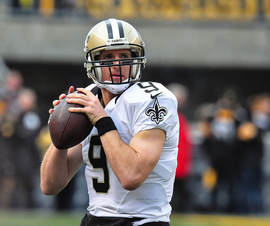 Creative Commons/Brook Ward Creative Commons/Brook Ward I recently launched Running, the third novel in my Jim Mitchell series and the student magazine at the college where I teach evening classes graciously agreed to review the book. The review was mostly a positive one, for which I was grateful. The critic noted, however, that I should have developed a secondary character more, as she found him interesting. You know what? She's absolutely right. There definitely was more to tell of his story that was not in the book. As a matter of fact, the character is worthy of a whole separate story, which is what he had a few years ago. The story of that book, which began as an intense short story that morphed in a powerful novel that never made it across the finish line, is my go-to example of how not every idea is golden. I was able to salvage some of the story and sneak it into Undue Pressure and some of what was left was enough to convert Running from a novella into a full-length (if shorter) novel. While I was happy with the final result, there was much more of his tale to be told. I was afraid that if I went too far afield with the secondary character, people would get frustrated that I had forgotten about our main guy. Maybe I was right, maybe I was wrong. One thing I do know is that Monday morning quarterbacking is easy to do, but I'm not sure it's a good thing to do. Sometimes you just have to accept that all work, even after its published, is still a work in progress.  Writer friends of mine often talk about “the olden days” when literary giants used to scribble out their manuscripts and fairy godmothers known as publishers took care of all that pesky publicity stuff. All Austen, Fitzgerald and Hemingway had to do was show up, sign books and bask in the adulation of their fans. OK, I’ll be the first to admit we might be looking at the past through rather rosy-colors lenses, but, with the rise of print-on-demand platforms, both indie and traditionally published authors are competing for the same audiences and need to employ new tools and techniques to get eyeballs to read your latest masterpiece. This has led to the creation of the Launch Team, a small cadre of loyal fans who read your work in advance and use their personal and social media network to boost interest (and eventual sales) of your work. People make this sound easy, but rest assured it is not. Basically, you need to recruit friends that will act like a literary Navy SEAL team. You want people who like your work and you enough to spread the word but do so for little pay or few rewards (unless you have the budget for that, which you probably don’t). You are, in essence, asking people for a favor with the hope they will help create the all-powerful “buzz” your book requires for success. My first book did fairly well, but, because of some mistakes on my part, book two sold rather poorly. This time around, I’m hoping that a little advanced planning, plus the kindness and generosity of my friends, this book launch will enjoy a bit more success. Next week we’ll find out if this hare-brained scheme actually works. 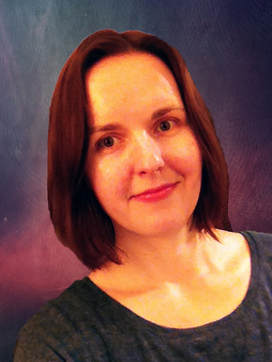 Science Fiction always seems to fall into two camps: an action/love story with scant (and sometimes questionable) sci-fi details thrown in or a jumble of so many technical specs that you forgot the two main characters are locked in a death battle 200 miles above the planet's surface. Thankfully Vera Brook, a scientist-turned-writer does not succumb to these faults. Her older YA novels Sand Runner and Cage Runner are fast-paced action stories with just the right amount of scientific detail for the story to flow and make sense. When did you first realize you were a storyteller? Good question. I’ve been a bookworm ever since I was a kid. If you love reading, chances are at some point you will reach for a pen and start writing. I’ve kept journals with story ideas ever since middle school. So that itch to make up stories was always there. I was also an English major in undergrad and took some creative writing classes where we wrote and critiqued each other’s stories. But I didn’t try to write a novel until years later, after I switched my career path to science. I guess it’s a sign that I’ve always been a storyteller at heart. What do you love about the writing process? Writing is an amazing activity. You start with nothing but a blank page and your imagination & life experience, and you can create whole new worlds. I love that creative freedom, and the feeling that there are no limits to what I can imagine and write about. I also love the surprises that come in the process of writing fiction. For me, writing is half careful, deliberate construction, and half a discovery process. The initial idea for a story or a novel can come from anywhere, and that’s always a thrill. (My advice: Write all the story ideas down. You may think you will remember them, but you won’t.) But after the initial idea, it can take me a good while to figure out the logic of the story and to fill in the details, and the final draft can be completely different from that original spark of inspiration. I also love creating—or discovering—my characters. They feel very real to me. Sometimes they even refuse to do what I want them to do, and I have to listen to them and change the story accordingly, or it won’t work. It’s a very strange experience, being bossed around by imaginary people you created, but I’m sure many writers can relate to that. Finally, I continue to be amazed by how mysterious the writing process is. Where do our ideas really come from? How do we put them together to weave a story? How do we switch from the free creative writer that puts the words down on the page, to the logical, critical editor who beats them into shape and fits them into a careful story structure? Language itself is a fascinating phenomenon and very closely tied to our humanity. I’m trained in neuroscience, and neuroscience tries to understand how everything we do works at the level of brain processes, down to neurons firing and neurotransmitters crossing the synapse. I don’t think we can explain anything as complex as creative writing, or language in general, at the neuronal level yet. Some clues may actually come from computer science and the development of AI that assists writers in either writing or editing their work. So I look forward to the breakthroughs that will come in the near future. I love writing—but it’s also the hardest and most frustrating activity I’ve ever done. So I wouldn’t mind an AI assistant who would help me get all the stories in my head down on paper faster and with less of a struggle. What is the hardest part of being a writer? All of it! The same things that make writing amazing also make it incredibly difficult. You are free to create whole new worlds, and write any story you want—but all of it takes a great deal of work, frustration, and trial and error. There is also no guarantee that your book will resonate with readers, or even be discovered by the readers who might enjoy it. So every book you write is a huge leap of faith, and you don’t know what’s going to happen at the end. All you can do is write the best book you can, keep improving your craft with every book after that, and not let silence or negative reviews discourage you form writing. I’m an indie writer—meaning, independently published—so discoverability is also a huge challenge. Indie authors are their own publishers. In addition to writing the book, I also format it for print and ebook, create my own covers, distribute the book on different platforms, and market it. (Although I do work with a professional, paid editor, to make sure my books are written to professional standards.) I actually enjoy all these publishing tasks, and I’m really glad I had to learn them. But marketing my books is difficult, because I have a very small budget to work with, and not much time to spare. (I have a full-time job which pays my bills, and I would rather spend my free time on writing than on marketing.) Still, this is a very exciting time to be an independently published author, and the difference between indie writers and traditionally published writers blurs a little more every day! For instance, the Science Fiction and Fantasy Writers of America (SFWA) has opened its doors to indie writers becoming members, and I’m sure other professional writing organizations are doing the same. And more and more indie writers can make a living on their books, often by developing strong online platforms and turning their books into multiple streams of income, which is great to see and very encouraging. The indie writing community is also very open & supportive, and that makes a huge difference because writing can be pretty lonely otherwise. It’s not a zero-sum game at all. We are all rooting for one another, and celebrating one another’s successes. More writers means more great books to read, and what’s not to love about that? Where do you find your inspiration? A story idea can come from anywhere—a dream, a scientific article I read, an experience I had as a kid, an overheard conversation, and, of course, other books. Also, giving yourself a break from writing to “recharge” helps. Whenever I get stuck in my writing, I go for a walk and just let my mind roam. It’s like you give your conscious mind a rest, but your unconscious brain keeps working on the problem, and I often have a solution by the time I come back from the walk. A lot of my writing is also inspired by my neuroscience training, and my interest in science and technology in general. I write science fiction, so there is usually some science and technology as the background for the story. For instance, in the Sand Runner series, one such technology is bionic prosthetics, or the new generation of prosthetic limbs that are directly linked to and controlled by the person’s nervous system. Such prosthetic limbs already exist and people use them every day, and they will get better and better, and make a huge difference to thousands of people. But it’s amazing to think about how much knowledge about the human nervous system went into designing such prostheses. So both the science and the applications are fascinating and a great source of story ideas. What are you working on right now? I’m usually juggling several projects. It’s probably not the fastest way to finish anything. But I find that it helps, because if I get stuck on one project, for whatever reason, I can switch to another and work on that. Right now my main project is book 3 in the Sand Runner series. It’s challenging because the story and the cast have gotten bigger and more complicated, and I have to be careful not to write myself into a corner. But I love these characters, both the “old” ones from book 1, like Kai, Emily, and Neen, and the newer ones, who appear only in book 2 or book 3. So it’s always a thrill to enter this world and to add another chapter to their story. I hope to finish, edit, and publish book 3 by the end of this summer. But I’m not a very fast writer, so we’ll see. I’m also working on some short stories, some tied into the Sand Runner series, others standalones. And I have, let’s see, four other series in development. Two of them are YA science fiction. The other two are middle grade (MG), and start more in the vein of magical realism but will “grow up” to be science fiction as the characters get older. To keep up with the Vera's latest adventures, check out her website, or follow her on Twitter or Pintrest. |
AuthorI've been writing stories and taking photos since I was old enough to hold a pencil and stand behind a tripod. Archives
February 2024
Categories
All
|
 RSS Feed
RSS Feed